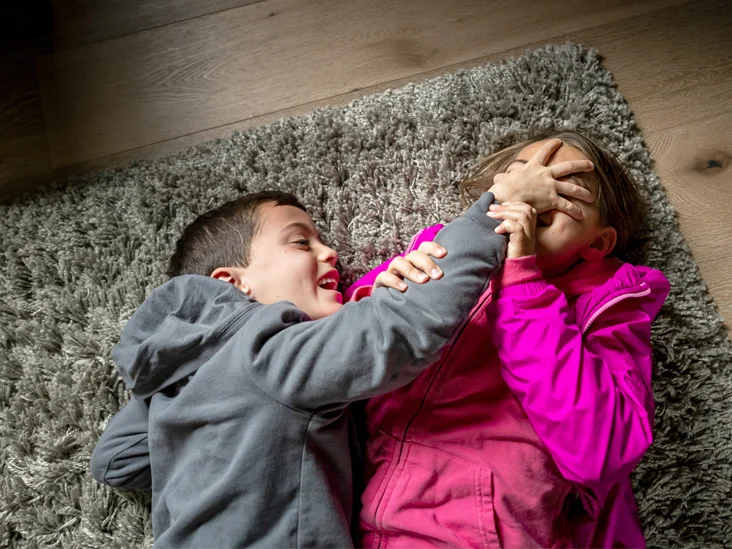Envy, competitiveness, and disagreement between brothers and sisters are a part of so-called sibling rivalry. Almost every parent with two or more children is concerned about this issue. Frequently, issues arise soon after the birth of the second child. It is common in childhood and can be irritating and painful for parents. If this is not stopped at the very beginning, it may lead to chaos later in life.

There are many ways you can help your kids to stay happy together. Furthermore, your children’s relationship will probably certainly deepen over time. Your children will improve if you work out difficulties with them. Have a look at the below provided causes and ways.
Causes of Sibling Rivalry
https://www.youtube.com/embed/4X-bbApr4Zg?feature=oembedDo not know what is sibling rivalry? Watch this
Major life transitions
Are you moving into a new house? Or going to have a baby? Or getting a divorce? Parents and children alike are stressed by these occurrences. Moreover, many children release their frustrations and concerns on the nearest target (i.e., their little sister)
Various phases and ages
Did your toddler ever hit your newborn? Sibling rivalry is more likely during specific stages of development. If both kids are of the same age. If one is elder and the other is younger, still it takes place.
Feelings of envy
You commended your 3-year-old for a lovely picture he did at childcare.. As a result, their elder brother or sister is threatening to break it apart. Why? They’re envious of the attention.
Uniqueness
Children, particularly siblings, have a natural need to set themselves apart from their classmates. Competitions to see who can construct the tallest skyscraper, race the fastest automobile, or eat the most waffles could result. You may think it’s small, but it’s critical to them.
Lack of ability to resolve conflicts
If your children watch you and your partner fighting in a loud or angry manner on a regular basis, they may emulate that behavior. They may run out of options for resolving their fights.
The dynamics of the family
If one child is ill or needs extra care, or if negative behaviors have been rewarded, it can have an impact on how the entire family interacts and treats one another. Think before you start going low on yourself for all of your life choices that make your kids hate each other. Your decisions may reinforce or intensify a sibling rivalry that already exists, but it’s doubtful that you’ve consciously encouraged your children to compete with one another.
5 Solutions to Sibling Rivalry

Maintain a calm, serene, and in command attitude
Keep an eye on what your children are doing so you can intervene before a problem arises or escalates. Maintain your composure, and your children will learn to do the same.
Create a collaborative atmosphere
Avoid making comparisons between your children. If you are favoring one over the other in any context, stop. Create possibilities for collaboration and compromise instead. Don’t forget to lead by example as well. The way parents connect with one another sets a good model for their children. If your children watch you or your spouse slam doors or argue loudly, they’ll be more likely to do the same and believe it’s a normal method of dealing with their problems.
Individuality should be celebrated
Children are less prone to fight if they believe you appreciate and value them as individuals and pigeonholing, and spend time with each child individually to show them that they are special to you. If one of your kids loves running about outside, wear your shoes and join them in the fun. Snuggle up next to the other youngster if they enjoy spending time reading their favorite book. Also, don’t forget that everyone has enough time and space to be alone.
Make plans to spend time with your family
Family meals, interactive games, and participation in activities are all great opportunities for kids to bond and make joyful memories. These occasions provide youngsters with less motivation to pick arguments with one another and allow them to spend more time with you.
Treat children fairly, rather than equally
Equality is important to parents, but this does not always mean fair. Punishments and rewards for your children should be suited to their specific needs. Don’t stress yourself in giving the same items to both your children. Instead, provide children with a variety of toys that are appropriate for their ages and interests. Fairness like this will go a long way.
5 approaches of resolving conflicts
To tangle, you’ll need two people
You’ll only get a glimpse of the events leading up to the fight on rare occasions. Don’t blame them, focus on each child’s role in the matter.
Listening
During a quarrel, the majority of the children feel frustrated and depressed. Respect your children’s sentiments by listening to them. Children will be more likely to cooperate if they feel heard, even though their feelings are not an excuse for unpleasant or aggressive behavior. If your baby begins to hit, remind him or her that violence will not be accepted. Remind them to use words to which they can listen.
Give your kids problem-solving skills
To avoid future conflicts, use disagreement as an opportunity to teach your children how to solve problems on their own. Show how they might compromise, share, or approach a comparable problem in a more positive, suitable manner.
https://www.youtube.com/embed/SbZaWRsypdo?feature=oembedResolve how?
Make the sanctions personal
If a quarrel between siblings necessitates retaliation, keep the talk private. This can humiliate a youngster in front of his or her siblings, causing them to become even more estranged. This is not the time to make a statement; rather, it is the time to teach a lesson.
Organize a family gathering
Bring the family together and have a discussion so that everyone has a chance to say what they want. It’s also a good time to establish house rules that everyone in the family can agree on. These rules should be posted somewhere public, such as the kitchen, to remind everyone of their commitment to raising a happy, healthy family.
Share with your friends